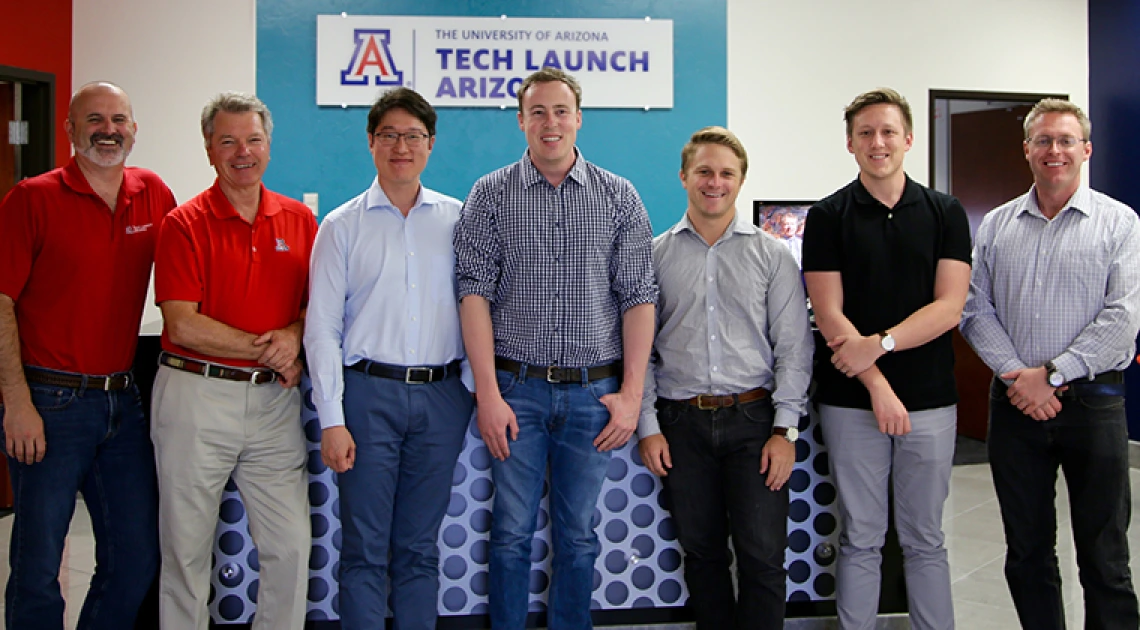Orphaned UA Drug Licensed to Company to Treat Canine Cancer

TUCSON, Ariz. – Garth Powis, Ph.D., formerly of the University of Arizona, College of Medicine in collaboration with colleagues at the University of Pittsburgh, Sanford Burnham Prebys Medical Discovery Institute, and Cascadian Pharmaceuticals, has developed a novel kinase inhibitor, PX-886, which is efficacious for the treatment of a variety of solid tumors in canines.
The University of Arizona has exclusively licensed the rights to PX-886 to Anivive Lifesciences, who is developing PX-866 as a best in class treatment for solid tumors in canines. To date, the Center for Veterinary Medicine at the FDA (CVM-FDA) has approved only two drugs to treat cancer in dogs (mast cell and mammary (breast) cancer). David Bruyette, D.V.M., Anivive’s chief veterinary officer, explained that traditional methods for treating canine cancers include surgery, chemotherapy, radiation therapy, and immunotherapy alone or in combination; each having their own set of side effects. Surgery is invasive and not appropriate for large, infiltrative or metastatic disease. The efficacy of chemotherapy and immunotherapy for dogs with many solid tumors is either unknown or results in poor long term efficacy.
“It’s clear there is an unmet medical need within veterinary health and we are excited to work with the University of Arizona on this important therapy,” says Dylan Balsz, who co-founded the company with Warren Rickard in 2015.
Anivive Lifesciences’ core mission is to find and leverage novel human therapeutics and repurpose them for unmet needs in veterinary medicine. One such drug was PX-886.
PX-866 is a novel small molecule drug derived from the natural product wortmannin that irreversibly inhibits phosphatidylinositol-3-kinase (PI-3K) a kinase known to be central to the pathogenesis of canine cancers such as malignant melanoma, osteosarcoma and hemangiosarcoma.
“We believe that PX 866 will be effective in treating tumors in dogs, especially melanoma,” says Paul Eynott, Ph.D., M.B.A., Tech Launch Arizona licensing manager for the UA College of Science. “The next step is to conduct studies to verify that and to identify other tumor indications that PX 866 could treat.”
Tech Launch Arizona, the office of the University of Arizona responsible for commercializing inventions stemming from University research, facilitated the PX-886 licensing agreement between the universities and Anivive. Throughout the process, Eynott collaborated closely with Dylan Balsz and Kwansun Ahn, CEO of Anivive Lifesciences, to negotiate the agreement.
“It has been wonderful working with such a seasoned team of entrepreneurs at Anivive and to see a seemingly abandoned technology undergo such a resurgence aimed at a clear unmet medical need in the veterinary space,” says Eynott.
The company’s goal is to launch PX-866 into the market by 2019.
Photo: From left to right: Doug Hockstad, TLA sr. director of technology transfer; David Allen, Ph.D., vice president of TLA; Kwansun Ahn, M.B.A., Anivive CEO; Dylan Balsz, Anivive co-founder; Codey Arbuckle, Ph.D., Anivive director of engineering; Warren Rickard, Anivive co-founder; and Paul Eynott, Ph.D., TLA sr. licensing manager. Photo credit: Taylor Hudson/Tech Launch Arizona

